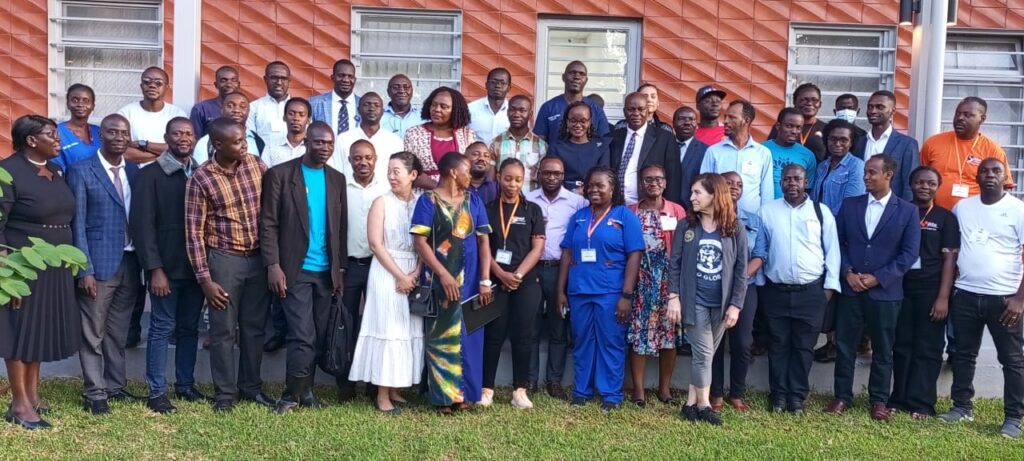Jinja: Dr. Jane Fualal Odubu, the chairperson of the Uganda Medical Board, has announced that all surgeries will now be carried out in Uganda, as the country has trained its own surgeons to conduct these operations.
The senior consultant surgeon made this statement on Friday, November 1, 2024, during the graduation ceremony of 21 surgeons who successfully completed a six-month laparoscopic training course at Kyabirwa Surgical Center in Northern Division, Jinja City.
The hands-on surgical course covered advanced laparoscopic procedures in gynecology, urology, and general surgery. Dr. Fualal asserted that the modern skills acquired by the surgical trainees in dissection, suturing, and stapling would enable them to perform operations on individuals throughout the country.
“You are now confident enough to touch any person and operate on them. Sometimes you surgeons fear that this is a minister or a member of parliament, and you hesitate to operate on them. The course you have completed empowers you to carry out surgical operations on anyone properly,” Dr. Fualal told the trainees.
She emphasized, “You don’t need a plane to perform those surgeries. I don’t want to hear again that someone flew to Asia for surgery. Please get everything done here in Uganda.”
Laparoscopic surgery involves less cutting and trauma to the abdominal wall and internal organs, resulting in less blood loss and a lower risk of hemorrhage. This makes it the gold standard for surgical interventions.
Dr. Fualal, who has performed over 20,000 surgeries in the last 20 years, stressed that the country has now matched the standards of Indian and Asian counterparts, as she has attended several meetings and training sessions abroad, with her knowledge being equivalent to that of Ugandan surgeons.
She urged the trainees, who are surgeon doctors from regional referral hospitals across the country, to be determined in applying their newly acquired skills. “Be determined enough that you can manage your patients well and save their lives,” she advised.
The training, which was the first of its kind in Africa, particularly in Uganda, attracted high-profile surgeon doctors eager to acquire advanced technological skills to enhance their practice.
Ms. Anna Turumanya Kalumuna, Director of Kyabirwa Surgical Center, highlighted that the training was a collaboration between the Jinja-based surgical center, the American College of Surgeons (ACS), the Society of American Gastrointestinal and Endoscopic Surgeons (SAGES), and Mount Sinai Health System.
Established in a rural area, the facility aims to extend surgical awareness to rural communities through mentorship programs. Ms. Turumanya said, “When local people think of surgery, they often think of going to Kampala. This organization extends such awareness to them.”
She elaborated that the surgical health facility has steadily expanded following the establishment of the Kyabirwa Surgical Centre Ward, which was initiated by a needs-based program conducted after three years of dedicated service to identify constraints and areas for improvement.
“We are proud to introduce the Women’s Health Clinic program, which addresses our community’s critical need for gynecological surgical services,” she said, adding that the gynecology department has already performed over 50 successful cases within six months of its establishment, demonstrating significant progress in meeting the healthcare needs of patients.
Dr. Peace Babalanda, a senior surgeon, encouraged the trainees to prioritize vigilance, especially with modern procedures while performing operations. “You need to be very selective with the patients you choose for this procedure. I have seen surgeons attempt laparoscopic techniques for cancer surgeries, and the majority have not performed well. This procedure is beneficial, but we also need to tailor it to specific patients,” she said.
Dr. Babalanda emphasized, “Let’s not be overly taken by technology and trends; what we really want is to provide the best service to patients that is safe and leads to good outcomes.”
Dr. Bright Mwanje Anderson, a surgeon at Mengo Hospital, was among the trainees. He underscored the importance of laparoscopic surgery, which results in less pain, fewer wound complications, and shorter hospital stays compared to traditional open surgery.
“We all know that when you are told you’re going to undergo surgery, there is a fear factor because you think about being cut open and stitched up. With this procedure, we operate inside the body using special instruments and high-definition cameras that allow us to see the interior,” said Dr. Mwanje.
Laparoscopic surgery can be performed on internal organs, particularly in the abdomen, but also in the chest, joints, and even the skull, without the need for large incisions, according to experts. “Even in very difficult spaces, we can see clearly, unlike traditional open surgery where large incisions are required,” he added.
Dr. Mwanje noted that the procedure is, however, limited by training costs and expressed hope that it would become regularly available to surgeons in the future. In Uganda, laparoscopic surgery costs at least shs 2 million for diagnostics (to identify medical problems inside the body), while a successful operation may average shs 3 million, depending on the complexity of the procedure, the patient’s hospital stay, and other requirements.
In closing remarks, Mr. Richard Gulume Balyainho, the Jinja City Resident Commissioner (RCC), expressed pleasure that the facility located in Jinja would significantly contribute to the health of Busoga residents and beyond.




